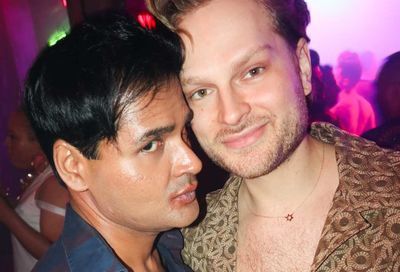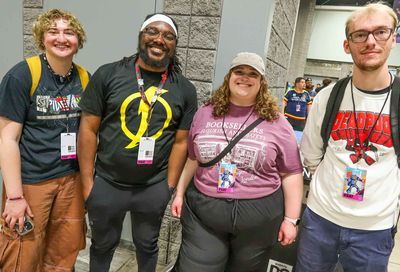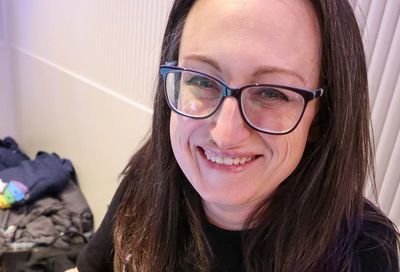Roses for the Maestro
Commentary: Center Field
When word came of Jim Holloway’s death on Dec. 30, it brought back a flood of memories of this man who directed the Gay Men’s Chorus of Washington from 1989 to 1999. He joined GMCW in 1983 as a first-rate pianist and accompanist, but grew into an innovative, talented director who brought a young chorus into the limelight of the gay choral movement.
In 1991, after a meeting where it was decided to hold the next national GLBT march on Washington in April 1993, I ran to Jim with an idea: This would be a perfect occasion to host a choral mini-festival, where we could invite ensembles and guest artists from around the country to enrich the cultural dimension of the march weekend, but that we would have to act quickly to secure a venue before anyone else thought of it.
Jim loved the idea, persuaded the board of directors, and they reserved Lisner Auditorium. On the march weekend we hosted three concerts featuring choruses from Atlanta, Chicago and San Francisco, the girl group BETTY, comedian Danny Williams, and Romanovsky & Phillips. A feather in Jim’s cap, it helped put GMCW on the map as one of the big gay choruses and it made the most of his contacts as a Gay and Lesbian Association of Choruses (GALA) board member.
That exhilarating weekend 15 years ago illustrated many of Jim’s gifts: vision, leadership, a blend of strong artistic will and collaborative spirit, a commitment to the role of gay choruses in the wider gay and lesbian movement, and love of music.
There were many great moments during his decade at the helm of GMCW, including a concert at Tivoli Gardens in Copenhagen in 1998, the magic of Pirates of Penzance that same year, commissioning a song cycle with three other choruses to mark Stonewall 25, and so much singing — at a convention of the American Choral Directors Association, at AIDS healing services, at GALA festivals in Denver and Tampa.
Jim started GMCW’s tradition of doing fully staged shows in the spring, the absence of which would now be unthinkable. He inaugurated its creation of commercial recordings, which now number 11. He understood that gay choruses weren’t just variations on traditional glee clubs or choirs, but a new phenomenon for which he helped create new music. He raised funds for GALA, and evangelized in the GALA network for compliance with copyright law, to which he brought his professional expertise at the Library of Congress.
Jim’s willingness to indulge silliness and camp in performances was as winning as the courage and grace he showed in his personal struggle with HIV/AIDS. A music director’s usual drag is white tie and tails, and he looked splendid in that. But at the holiday concert in 1998, when we appeared for the second half in pajamas, Jim took the podium in an elegant bathrobe and slippers. He could be imperious when need be, but he was part of the family.
A performing arts group must do two things to survive: take creative risks and pay the bills. Without one, the other won’t matter. When Jim said at a board meeting, ”I will not program to the market,” he was being unreasonable. But he showed the good sense to put up resistance to the board member who wanted to program only show tunes. Our fights over program and direction were not blemishes in an otherwise serene procession from triumph to triumph, but a key to our growth. The creative tension between artistic director and board yielded something greater than either could have produced alone.
As an accomplished accompanist, Jim had learned unobtrusiveness. After he took up the baton, it was a pleasure watching him grow in the spotlight, and share that spotlight. He was in his element whether laughing in the pit during a run-through of Pirates, playing the band leader in Homecoming Hop, or raising goose bumps at the Mayor’s Arts Awards with his story of a breakthrough moment when the chorus sang our hearts out and won over a hostile crowd during a celebration of Martin Luther King’s birthday. When current director Jeff Buhrman paid tribute to him from the stage at the Kennedy Center in 2001, the packed hall enveloped Jim in love.
One last time, then: roses for the maestro.
Richard J. Rosendall is a writer and activist who co-founded the Gay Men’s Chorus of Washington in 1981. He can be reached at rrosendall@starpower.net.
Support Metro Weekly’s Journalism
These are challenging times for news organizations. And yet it’s crucial we stay active and provide vital resources and information to both our local readers and the world. So won’t you please take a moment and consider supporting Metro Weekly with a membership? For as little as $5 a month, you can help ensure Metro Weekly magazine and MetroWeekly.com remain free, viable resources as we provide the best, most diverse, culturally-resonant LGBTQ coverage in both the D.C. region and around the world. Memberships come with exclusive perks and discounts, your own personal digital delivery of each week’s magazine (and an archive), access to our Member's Lounge when it launches this fall, and exclusive members-only items like Metro Weekly Membership Mugs and Tote Bags! Check out all our membership levels here and please join us today!




















